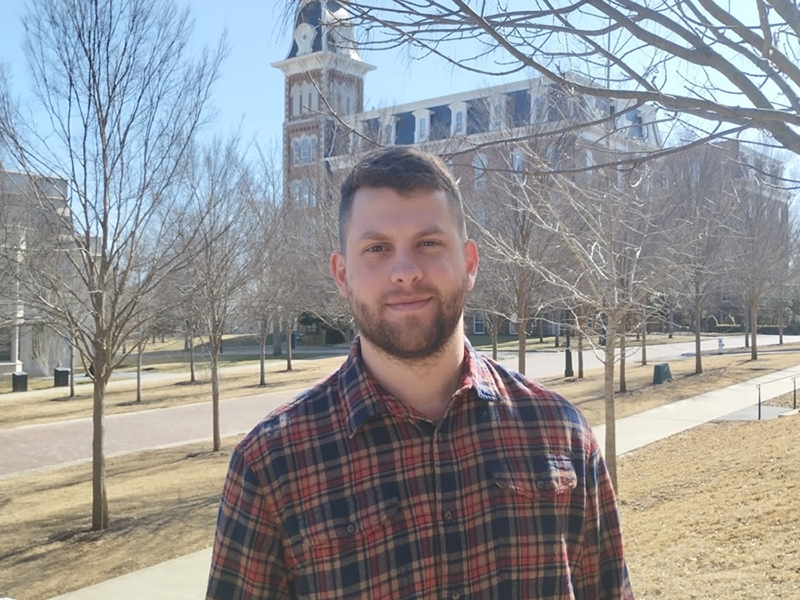Crop Science M.S. Student Fernandes Second in National Yield Prediction Contest

Igor Fernandes is a master's degree student in crop, soil and environmental sciences from Brazil. His adviser is Sam Fernandes, assistant professor in the Agricultural Statistics Laboratory.
Igor Fernandes, a master's degree student in crop, soil and environmental sciences in U of A's Dale Bumpers College of Agricultural, Food and Life Sciences, recently placed second in an international prediction contest conducted by the Genomes to Fields Initiative.
G2F collected data on more than 180,000 corn field plots, including 2,500 hybrids and 162 unique environments. Competitors developed prediction models to predict maize yield based on genetic and environmental data from trials, datasets and other publicly available information. From Nov. 15-Dec. 15, contestants had access to training data and they had to submit their predictions by Jan. 15.
The Genotype by Environment contest was open to teams and individuals, and Fernandes developed his model individually. He is now working with his adviser, Sam Fernandes, assistant professor of agricultural statistics and quantitative genetics, to improve his prediction model. Fernandes is with the Agricultural Statistics Laboratory and is a researcher and scientist with the Arkansas Agricultural Experiment Station, the research arm of the U of A System Division of Agriculture. His research ties into work with the departments of crop, soil and environmental sciences and horticulture.
A team from Corteva Agriscience won the contest and $4,000 prize with a Mean Root Mean Square Error score of 2.328863. Fernandes was second among 33 entries with a score of 2.345147. For this contest and this RMSE metric, lower scores are better. Models with a lower RSME mean the predicted maize yield is more similar to the actual yield when compared to another model with a larger RMSE.
"We used trial data from 2014 to 2021 to build the prediction models and had to evaluate the predictions on unseen trials from 2022," Fernandes says. "We had to make predictions for different environments and different maize hybrids. My solution consisted in creating meaningful predictor variables, the so-called feature engineering process, and building a gradient boosting machine learning model with those variables."
He said his solution included using aggregations, such as calculating the mean, standard deviation and others, from time series climate variables to summarize climate patterns for each season in each environment.
"Another useful technique used was the adoption of lagged variables, which means that we take a variable and look at its pattern in a previous window, which could be from the previous year or the previous two years, and use it as a predictor," Fernandes says.
More on the Agricultural Statistics Laboratory here.
Genomes to Fields focuses on efficiently and sustainably producing a safe, dependable food supply for a growing world population, which requires the development and management of crop varieties that will perform well in spite of increased weather variability. A widescale plant phenotyping initiative is proposed, which will expand understanding of the interacting roles of crop genomes and crop environments (including weather and management practices) on crop performance. By improving the ability to predict crop performance in diverse environments, the initiative will enhance capabilities to develop new varieties and manage the effects of weather variability on crop productivity.
About the Dale Bumpers College of Agricultural, Food and Life Sciences: Bumpers College provides life-changing opportunities to position and prepare graduates who will be leaders in the businesses associated with foods, family, the environment, agriculture, sustainability and human quality of life; and who will be first-choice candidates of employers looking for leaders, innovators, policy makers and entrepreneurs. The college is named for Dale Bumpers, former Arkansas governor and longtime U.S. senator who made the state prominent in national and international agriculture. For more information about Bumpers College, visit our website, and follow us on Twitter at @BumpersCollege and Instagram at BumpersCollege.
About the University of Arkansas: As Arkansas' flagship institution, the U of A provides an internationally competitive education in more than 200 academic programs. Founded in 1871, the U of A contributes more than $2.2 billion to Arkansas' economy through the teaching of new knowledge and skills, entrepreneurship and job development, discovery through research and creative activity while also providing training for professional disciplines. The Carnegie Foundation classifies the U of A among the top 3% of U.S. colleges and universities with the highest level of research activity. U.S. News & World Report ranks the U of A among the top public universities in the nation. See how the U of A works to build a better world at Arkansas Research News.
Topics
Contacts
Robby Edwards, director of communications
Dale Bumpers College of Agricultural, Food and Life Sciences
479-575-4625,
robbye@uark.edu
Headlines
PetSmart CEO J.K. Symancyk to Speak at Walton College Commencement
J.K. Symancyk is an alumnus of the Sam M. Walton College of Business and serves on the Dean’s Executive Advisory Board.
Faulkner Center, Arkansas PBS Partner to Screen Documentary 'Gospel'
The Faulkner Performing Arts Center will host a screening of Gospel, a documentary exploring the origin of Black spirituality through sermon and song, in partnership with Arkansas PBS at 7:30 p.m. Thursday, May 2.
UAPD Officers Mills and Edwards Honored With New Roles
Veterans of the U of A Police Department, Matt Mills has been promoted to assistant chief, and Crandall Edwards has been promoted to administrative captain.
Community Design Center's Greenway Urbanism Project Wins LIV Hospitality Design Award
"Greenway Urbanism" is one of six urban strategies proposed under the Framework Plan for Cherokee Village, a project that received funding through an Our Town grant from the National Endowment for the Arts.
Spring Bike Drive Refurbishes Old Bikes for New Students
All donated bikes will be given to Pedal It Forward, a local nonprofit that will refurbish your bike and return it to the U of A campus to be gifted to a student in need. Hundreds of students have already benefited.




